牛津高中英语模块五第一单元Task
- 格式:doc
- 大小:73.50 KB
- 文档页数:17
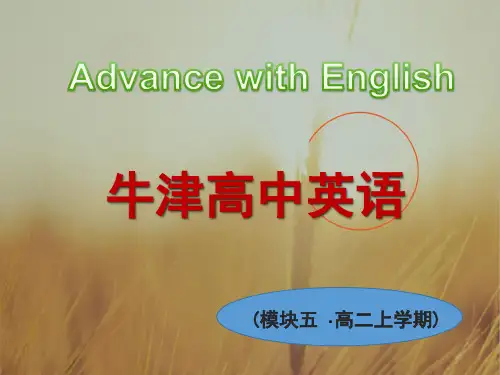
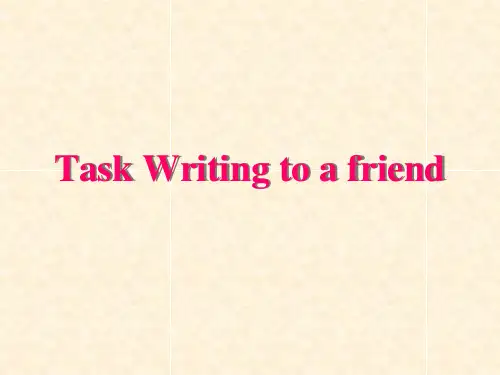

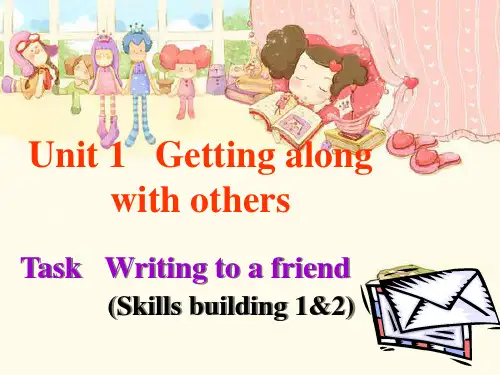
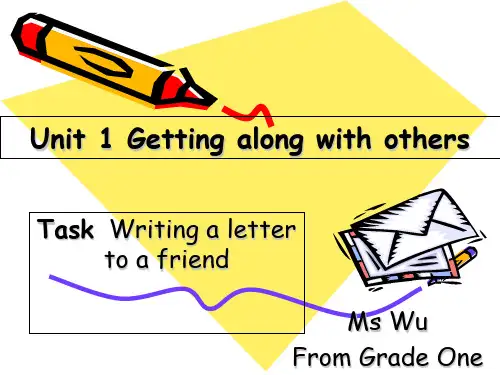
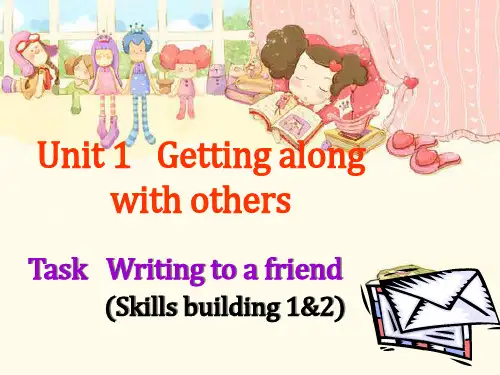

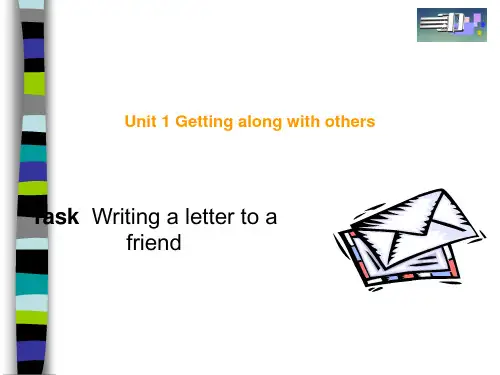
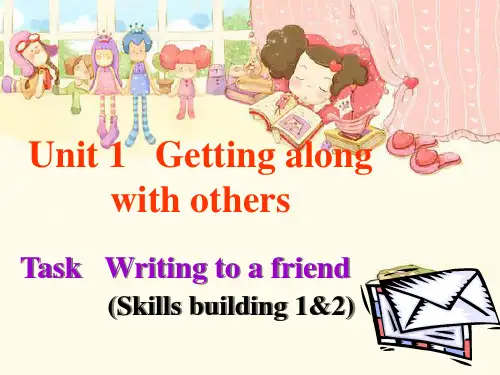

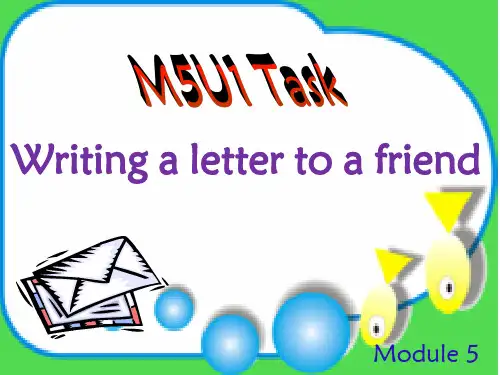
牛津英语模块五第一单元t a s k教学案Unit1 Getting along with othersPeriod 5 Task Writing a letter to a friend Objectives:1. Discuss friendship and practise agreeing and disagreeing.2. Write a letter to a friend.3. Learn and practise language skills of listening, reading, speaking and writing.Focus and difficulties:1. The way to show agreeing and disagreeing.2. Write a letter to a friend.3. Learn to use some useful words and expressions.Procedures:Skills building 1:Writing down the answers1. Brainstorming:What do you do when you have a personal problem?Would you talk to your parents or your friends and ask them for advice?Have you ever called a radio programme for advice?2. Read the leaflet about Teen Talk and do the exercise in Part ASkills building 2: Agreeing and disagreeing1. Go through the expressions.I agree with you on/that…I am of the same opinion (as…).Exactly. That’s a good point.That’s how I feel (about…) too.That’s right.You’ve got a point. Yes. And another reason is that…I don’t agree. What about…?I’m not sure that’s true.I see things slightly differently. On the other hand, …Perhaps you are mistaken. Really? I don’t think that…I take your point, but…That’s true, but…3. Group work:Have a talk with your partner about friendship, using at least 4 kinds of expressions of both agreeing and disagreeingSkills building 3: Proofreading1. What is proofreading? (Finding careless mistakes that you have made.)2. What should we check for?3. Your friend Rebecca wrote about her twin brother in her diary. She asked you to check it for mistakes. There is one mistake in each line.WritingWrite a letter to your two friend s who don’t like each other. Please include the following ideas:精品资料your feelings about friendshipwhat their friendships mean to youyour feelings about good friendswhat makes a good friendship last as well.Focus and exercises:I. Put the following into English:1. 提前 _______________2. 一段难受的时光______________3. 感到焦虑 ______________4. 在沉默中 ________________5. 接通(电话) _____________6. 就价格和他们达成一致意见___________________________________7. 正是,一点不错。
牛津高中英语模块五第一单元Task, Project 的导学案Skills building 1: Writing down the answers1. Lead-inYou are a reporter of your school newspaper and going to have an interview with your headmaster next week, what should you do?2. Turn to page 12 and find some guidelinesa. Questions: Prepare them in advance.b. Notes: 1).Brief notes only, not whole sentences.2).Make the notes which you can understand later.3).Use contractions and abbreviations if possible.c. Tip: Be polite when you ask others to repeat. Use:I beg your pardon? / Pardon me? Could you say that again?Could you repeat that, please? Did you say… or…?3. Listeninga. Discuss freely:Have you ever moved to a new town or neighbourhood?What did you do when you meet your new neighbours?What did you talk about when you met your new neighbours for the first time? How did you make friends with your new neighbours?b.Listen to the radio programme and make notes(fill in the blanks)1. What things might worry you when you move to a new place?How to find my way around, _meet people and make new friends2. What is one way to meet new neighbours?Visit their homes with a small gift3. What are some things you should do when you meet a person for the first time? Be open and honest about myself; ask him/her questions about himself/herself; listen to what he or she has to say.4. If you want to meet people with similar interests to yours, what can you do? Join a local club or activity group.5. What are some things you should do if you want to make true friends? Always be there for them ; listen to what they have to say; be honest about myself and my feelings.Step 1 : Calling Teen Talk for advice1. Brainstorming:What do you do when you have a personal problem?Would you talk to your parents or your friends and ask them for advice?Have you ever called a radio programme for advice?2. Read the leaflet about Teen Talk and do the exercise in Part AKeys to Part A Teen talk1 You can read Teen Talk by: e-mail / phone / website.2 Teen Talk never closes. True False3 Teenagers’ problems wil l be reported to parents Ture False4 Teen Talk listen to teenager s’ problems .5 Teen Talk offers advice/tips/suggestions .Keys to Part B.1. Reason for calling Teen Talk : Have a problem; ask for help2. Description of the problem: two important friends; don’t like oen another3. Feelings about the rpoblem: feel divided4. TeenTalk’s advice: write a letter to friend and explain ; meet outside of school5. Planned actions to overcome the problem: write a letter; meet at a caféon Saturday; talkSkills building 2: agreeing and disagreeing1. Lead-inWhat do you often do with your friends?Have you ever write letters to your friends?It’s a waste of time to write to your friends every day, don’t you think so?2. The way to express agreement and disagreement in English :a. Agreeing:b. DisagreeingI agree with you on/that…I don’t agree. What about …?I am of the same opinion (as…).I’m not sure that is true.Exactly. I see things in a little different way.That’s a good point. On the other hand, …That’s how I feel (about…) too.Perhaps you are mistaken.That’s right.Really? I don’t think that …You’ve got a point.I take your point , but …Yes. And another reason is that…That’s true, but…c. Tips:If you disagree with someone you should express your opinions politely.Others will take your opinions more seriously if you state them calmly and politely.3.Group work:Express your opinions on the statements on page 14 by stating whether you agree or disagree, using the expressions just learned.1. I agree that Chinese food is healthier for you than foreign food. Chinese food usually includes plenty of whole grains, vegetables and good source of calcium, which are considered healthy and nutrious. Besides this, Chinese people pay special attention to the ways of cooking food. The color, the smell and the taste are all taken into consideration as they might affect one’s appetite. However, most foreign meals contain more fat and are baked or fried, which may cause them to lose flavour. Chinese food is now eaten by one third of the world’s population every day and is widely considered easy to cook, economical and tasty.I don’t agree that Chinese food is healthier for you than foreign food. The traditional Chinese way of cooking vegetables may cause vitamins to be lost. Besides this, Chinese people use too much oil and salt in cooking, which might cause many health problems. However, foreign food, known for its varied flavours and spices, is rapidly becoming a trend worldwide.4. Someone told me that having a good job doesn’t necessarily make you happy. That might be true, but in my opinion, a good job is necessary if I want to be happy in the future. There are many reasons for this. First, a good job canoffer us a good salary. Money is not everything, but we can’t afford many things we needwithout it. Second, a high-paying job is always a big challenge. I enjoy being challenged. Furthermore, a good salary may offer us more oportunities to help others and to relax.I don’t agree that I must have a good job if I want to be happy in the future. Before we discuss this, we need to talk about what true happiness is. True happiness is to feel and experience various things during our lives. We have more important things to value in life than a good salary.5. Some people believe that good marks indicate how clever you are, but I see things differently. School is not everything. Success and happiness can’t be measured by good marks. Students should not be so stressed out by their studies. This can often have a bad effect on their health. Even if we don’t get good marks in our studies, we can be successful in many other things in life. Good marks indicate how clever you are. That’s how I feel. Doing well in exams is the only way to succeed in a highly competitive world. Some people don’t think school is very important, but I disagree. Good marks show how well you have studied and how capable you are. This is what universities and employers care about.6. I think learning a foreign language is important. Language is an important tool for people to communicate with each other, as well as a way to pass on their culture and knowledge. Nowadays, the number of people travelling to other countries is increasing. Mastering a foreign language is becoming a mustfor them to live in a foreign country or understand other nationalities better.I don’t think that learning a foreign language is important. Take myself for example. I spent some time in Britain on an exchange programme. I spent a lot of time learning English before I went abroad. It has been almost two years since I came back and I have forgotten a lot of English because I hardly use it now. Spending too much time on a foreign language is a waste of time.Step 2: discussing friendship with others1. Look at the table of part A on page 15Have a discussion on friendship and asks your classmates at least three questions for their opinions on friendship. Note the responses in the table.2.Discussion (pair work)Discuss the following statements on friendship and decide whether you agree or disagree with them.Friendship is an important part of my life.A good friend must be honest, kind and have a sense of humour.One or two good friends are better than 100 acquaintances.Skills building 3: checking your work1.lead-inWhat should we check for?Read the points on page 16 and find the answers.2. In particular, we should check for:Facts: make sure the facts are accurate.Grammar: Check that you have used the correct tenses, parts of speech, sentencestructures, etc. Make sure the verb agrees with the subject.Handwriting: Make sure your handwriting is clear.Punctuation: Check that all punctuation marks are used correctly and that none are missing.Vocabulary: Check that you have used the right words.Spelling: Look out for spelling mistakes.Style(formal/informal): Make sure that the choice of vocabulary and sentence structure matches the style of writing.3. Your friend Rebecca wrote about her twin brother in her diary. She asked youto check it for mistakes. There is one mistake in each line.Make corrections as follows: ‘^’to insect a missing wor or punctuation mark; ‘_’underline a wrong word or wrong punctuation mark and write the correct word or punctuation mark above it; ‘\’to cross out an extra word or punctuation mark.1. 15 Apirl2. Today, I found out something about my brother could get him3. into a lot of trouble. I’m not sure if to tell Mum and Dad.4. Although William and I are almost 18, but Mum and Dad are still5. quite strict to us. Recently, William has begun wearing some strange6. clothes. and he looks quite different from before.7. The other day I saw him smoked in his room, with two of his friends,8. Jack and Sean. I know Mum and Dad would be extreme angry me if they9. knew that I had kept this secret for them. Maybe I should tell them, so they10. won’t blame me for keep a secret.11. However, I don’t think William will live at home for much longer as hes12. planning to go to university soon, His grades are still good. It seems13. that his behaviour hasn’t hurt he studies. Maybe I should just keep14. my month shut. What should I do?Step 3: Writing a letter to your friend1.Write a letter to a friend about what his or her friendship means to you. using information gathered in Step 1 and2.2.Group work: each member of the group contributes something to the planning of the outline of the letter.3. Write the letter based on the outline in Part A on page 17.your feelings about friendship the qualities of a good friendyour feelings about best friends what makes a good friendship last4.Presentation Let’s invite several groups to read their letters to the classHomework1. Finish any additional exercises.2. Preview the ProjectStep 1 lead-inPresent a questionnaire and conduct a survey about different attitudes to friendship between boys and girls with the whole classQuestionnaireAre you a boy or a girl? Boy GirlTick the answer which most applies to you.1. How many best friends do you have?A lot A few None2. How often do you have a long conversation with your friends?More than three times a week once a weekseldom never3. What topics do you mostly talk about with your friends?Hobbies and interests Families and friendsSchool and study Emotions and feelingsFuture plans and dream4. Do you share your secrets with your best friends?Always Sometimes Never5. Do you think boys and girls have the same attitudes towards friendship?Yes No6. If you choose No to Question 5 , what different attitudes do they have? Girls seem to have more to talk about with their best friends than boys. Friendships between girls are usually based on shared feelings and support. However, friendships between boys are usually based on shared activities or interests.Girls have more friendships than boys.Step 2 Reading A Teenagers’freindshipsSkimming: Read the passage fast, and find the answers to these questions:1. What is the passage mainly discussing?( Teenage boys and teenage girls have different attitudes to friendship.)2. What puzzles Robert?( He can’t understand how girls can talk for so long.)3. What’s the difference between boys and girls in their attitudes towards friendship?(Girls usually like sharing feelings and support with their best friends, so they have a lot to talk with each other. Boys like sharing activities or interests, and seem unwilling to share feelings with their best friends.)4. What are boys’ and girls’ friendships each based on?( Boys’friendships are based on shared activities or interests, while girls’friendships are anchored in shared feelings and support. )Scanning: T or F questions:1. Girls have more friends than boys, according to studies. ( T )2. Boys can easily name a best friend when asked. ( F )3. A boy is likely to be cautious about sharing his feelings with his close friends. ( T )4. A girl’s best friend might be eager to tell her about something that has happened in her life. ( T )Read in detail:1. What did Amanda reply when asked what she and her friend talked about? They talked about everything: film stars, pop songs recipes and everything.2. Why can’t boys name a single best friend?(Because they are busy with homework and have so many friends that it is hard for them to choose. )3. Can girls name their best friends? Yes. They can answer without pausing. Reading B1. Have students read the article ‘ What friendship means to me ’. Ask them to underline the key sentences which tell what the writer thinks about themeaning of friendship.1). Friendship means not being alone. 2). Friendship means having someone I can rely on. 3). Friendship means being committed to others. In conclusion, when we are old and look back on our lives, we will remember those who we loved and those who loved us.2. Have students read the article again and find out how many parts it can be divided into and what the main idea of each part is.Part 1: Para 1. ( What the writer thinks the most important thing in life is. ) Part 2: Paras 2—4 ( What friendship means to the writer.)Part 3: Para5 ( What can always be remembered.)3. Have students do Parts B1 and B2 on Page 91 in the workbook to practise using some words and phrases in this section.4. Have students do Parts D1 and D2 on Page 93 in thw workbook as their homework.Step 3 长难句的分析1. When asked, they usually hesitate before responding, ‘ My best friend? I can’t think about that. I am busy with my homework, and I have so many different friends that it is hard to choose just one best friend. ’ (P18L15—18)当被问起时,他们在回答前往往会犹豫一下:“最好的朋友?我没想过这个问题。